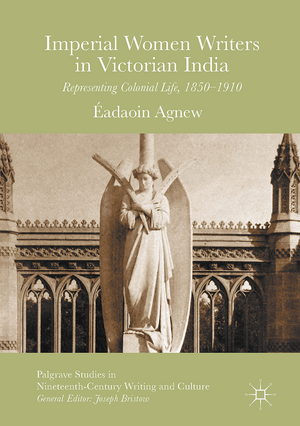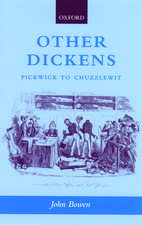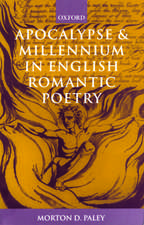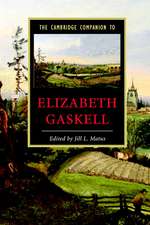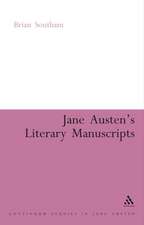Imperial Women Writers in Victorian India: Representing Colonial Life, 1850-1910: Palgrave Studies in Nineteenth-Century Writing and Culture
Autor Éadaoin Agnewen Limba Engleză Hardback – 26 iun 2017
This book is about Victorian women’s representations of colonial life in India. These accounts contributed to imperial rule by exemplifying an idealized middle-class femininity and attesting to the Anglicisation of the subcontinent. Writers described familiarly feminine modes of experience, focusing on the domestic environment, household management, the family, hobbies and pastimes, romance and courtship and their busy social lives. However, this book reveals the extent to which their lives in India bore little resemblance to their lives in Britain and suggests that the acclaimed transportation of the home culture was largely an ideological construct iterated by women writers in the service of the Raj. In this way, they subverted the constraints of Victorian gender discourses and were part of a growing proto-feminism.
| Toate formatele și edițiile | Preț | Express |
|---|---|---|
| Paperback (1) | 491.97 lei 38-44 zile | |
| Springer International Publishing – 28 iul 2018 | 491.97 lei 38-44 zile | |
| Hardback (1) | 584.43 lei 22-36 zile | |
| Springer International Publishing – 26 iun 2017 | 584.43 lei 22-36 zile |
Din seria Palgrave Studies in Nineteenth-Century Writing and Culture
- 20%
 Preț: 691.57 lei
Preț: 691.57 lei - 15%
 Preț: 646.30 lei
Preț: 646.30 lei -
 Preț: 390.63 lei
Preț: 390.63 lei -
 Preț: 390.63 lei
Preț: 390.63 lei - 15%
 Preț: 526.18 lei
Preț: 526.18 lei -
 Preț: 389.11 lei
Preț: 389.11 lei -
 Preț: 390.63 lei
Preț: 390.63 lei -
 Preț: 384.70 lei
Preț: 384.70 lei -
 Preț: 388.72 lei
Preț: 388.72 lei -
 Preț: 388.72 lei
Preț: 388.72 lei -
 Preț: 388.72 lei
Preț: 388.72 lei -
 Preț: 390.63 lei
Preț: 390.63 lei -
 Preț: 389.31 lei
Preț: 389.31 lei -
 Preț: 388.72 lei
Preț: 388.72 lei - 15%
 Preț: 700.75 lei
Preț: 700.75 lei - 18%
 Preț: 731.10 lei
Preț: 731.10 lei -
 Preț: 387.75 lei
Preț: 387.75 lei - 15%
 Preț: 651.51 lei
Preț: 651.51 lei -
 Preț: 390.63 lei
Preț: 390.63 lei -
 Preț: 390.63 lei
Preț: 390.63 lei -
 Preț: 386.81 lei
Preț: 386.81 lei -
 Preț: 387.75 lei
Preț: 387.75 lei -
 Preț: 392.97 lei
Preț: 392.97 lei -
 Preț: 389.11 lei
Preț: 389.11 lei -
 Preț: 389.88 lei
Preț: 389.88 lei - 15%
 Preț: 641.71 lei
Preț: 641.71 lei -
 Preț: 386.61 lei
Preț: 386.61 lei - 15%
 Preț: 584.43 lei
Preț: 584.43 lei -
 Preț: 392.60 lei
Preț: 392.60 lei -
 Preț: 390.84 lei
Preț: 390.84 lei - 15%
 Preț: 642.36 lei
Preț: 642.36 lei - 15%
 Preț: 582.80 lei
Preț: 582.80 lei - 15%
 Preț: 639.25 lei
Preț: 639.25 lei -
 Preț: 388.72 lei
Preț: 388.72 lei -
 Preț: 387.20 lei
Preț: 387.20 lei - 15%
 Preț: 642.51 lei
Preț: 642.51 lei -
 Preț: 384.31 lei
Preț: 384.31 lei -
 Preț: 387.75 lei
Preț: 387.75 lei -
 Preț: 389.70 lei
Preț: 389.70 lei -
 Preț: 386.81 lei
Preț: 386.81 lei
Preț: 584.43 lei
Preț vechi: 687.56 lei
-15% Nou
Puncte Express: 877
Preț estimativ în valută:
111.83€ • 117.06$ • 93.08£
111.83€ • 117.06$ • 93.08£
Carte disponibilă
Livrare economică 10-24 martie
Preluare comenzi: 021 569.72.76
Specificații
ISBN-13: 9783319331942
ISBN-10: 3319331949
Pagini: 296
Ilustrații: VII, 203 p.
Dimensiuni: 148 x 210 x 16 mm
Greutate: 0.43 kg
Ediția:1st ed. 2017
Editura: Springer International Publishing
Colecția Palgrave Macmillan
Seria Palgrave Studies in Nineteenth-Century Writing and Culture
Locul publicării:Cham, Switzerland
ISBN-10: 3319331949
Pagini: 296
Ilustrații: VII, 203 p.
Dimensiuni: 148 x 210 x 16 mm
Greutate: 0.43 kg
Ediția:1st ed. 2017
Editura: Springer International Publishing
Colecția Palgrave Macmillan
Seria Palgrave Studies in Nineteenth-Century Writing and Culture
Locul publicării:Cham, Switzerland
Cuprins
Introduction.- Chapter 1: There’s No Place like Home: Homes and Gardens in Victorian India.- Chapter 2: Good Housekeeping: Household Management and Domestic Organisation.- Chapter 3: Family Ties: Imperial Women as Wives and Mothers.- Chapter 4: Ladies of Leisure: Pastimes, Hobbies and Daily Routines.- Chapter 5: Hot Gossip: Romance and Courtship in Victorian India.- Chapter 6: High Society: Hill Stations and Social Occasions.- Epilogue.- Works Cited.-
Recenzii
“As a work of literary analysis and a study of cultural history, Agnew’s monograph contributes significantly in content and approach to the field of Victorian, postcolonial, and gender studies. Drawing on a substantial body of lesser-known primary works by imperial women writers, and a flourishing subset of secondary scholarship on Empire and women, Agnew produces a volume that is not only critically valuable but also an enjoyable read.” (Shuhita Bhattachargee, English Literature in Transition 1880-1920, Vol. 62 (3), 2019)
Notă biografică
Éadaoin Agnew is Senior Lecturer at Kingston University, UK. She studied her BA at Trinity College, Dublin before completing her MA and PhD at Queen’s University, Belfast. She has previously published articles on the travel writing of Lady Hariot Dufferin and Marianne North, and book chapters on travel writing in nineteenth-century Ireland. She is currently working on a scholarly edition of two women travel writers - Mrs A. Deane's A Tour through the Upper Provinces of Hindostan (1823) and Julia Charlotte Maitland's Letters from Madras During the Years 1836-39, by a Lady (1843) - to be published in 2018.
Textul de pe ultima copertă
This book is about Victorian women’s representations of colonial life in India. These accounts contributed to imperial rule by exemplifying an idealized middle-class femininity and attesting to the Anglicisation of the subcontinent. Writers described familiarly feminine modes of experience, focusing on the domestic environment, household management, the family, hobbies and pastimes, romance and courtship and their busy social lives. However, this book reveals the extent to which their lives in India bore little resemblance to their lives in Britain and suggests that the acclaimed transportation of the home culture was largely an ideological construct iterated by women writers in the service of the Raj. In this way, they subverted the constraints of Victorian gender discourses and were part of a growing proto-feminism.
Caracteristici
Draws from a wealth of sources such as letters, memoirs, contemporary and primers Re-energizes the recuperation of women's travel writing Draws upon feminist and post-colonial criticism to suggest that the overlooked narratives examined here have much to offer our understanding of how women contributed to colonial discourse and imperial identity
